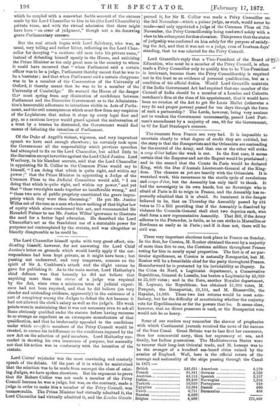The Lord Chancellor himself spoke with very great effect, vin-
dicating himself, however, for not answering the Lord Chief Justice's letter on grounds which would hardly apply if the cor- respondence had been kept private, as it might have been ; but passing not undeserved, and very temperate, censure on the spirit of Sir A. Cockburn's attack and the slight excuse he gave for publishing it. As to the main matter, Lord Hatherley's chief defence was that honestly he did not believe that anything more than the status of a judge was required by the Act, since even a minimum term of judicial experi- ence had not been required, and that he did believe (on very slender and misleading evidence, apparently) in the existence of a sort of conspiracy among the Judges to defeat the Act because it had not allowed the clerk's salary as well as the judge's. His weak points were in maintaining that it was not necessary even to ask all those obviously qualified under the statute before having recourse to so strange an expedient as an extempore manufacture of that qualification, and that he irrelevantly appealed to the conditions under which ex-officio members of the Privy Council would be created, to excuse his indifference to the conditions imposed by the new Act on the selection of paid members. Lord Hatherley suc- ceeded in showing his own innocence of purpose, but assuredly not that his action was in conformity with the intention of the statute.


































 Previous page
Previous page